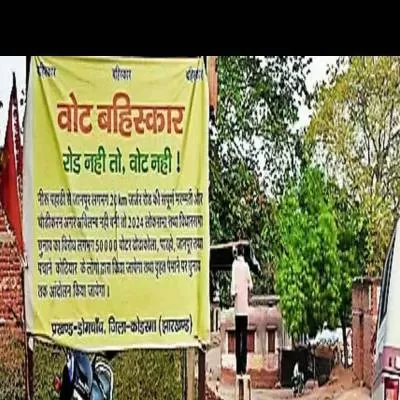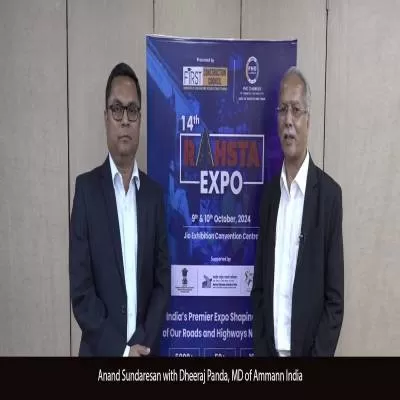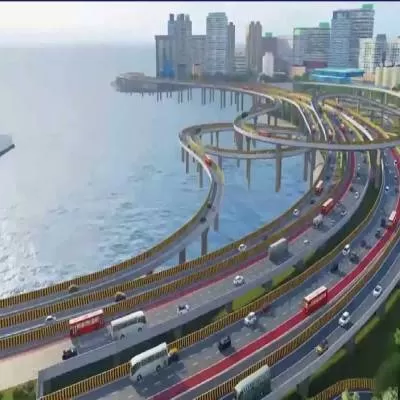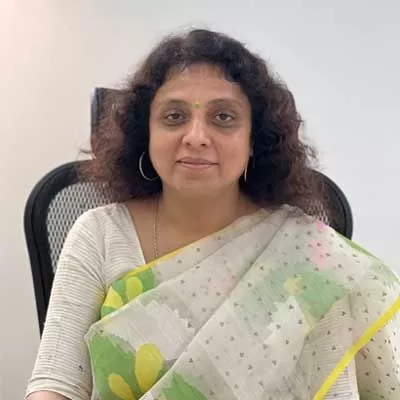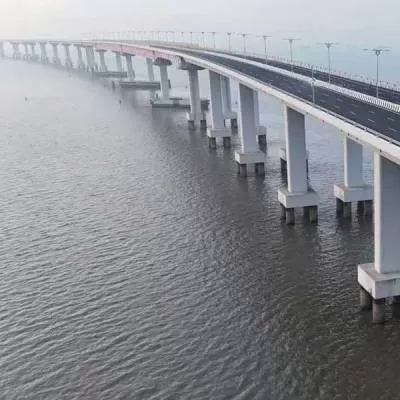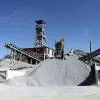- Home
- Infrastructure Transport
- ROADS & HIGHWAYS
- Here's the construction status and tendering opportunities across eight leading metro-rail projects in India

Here's the construction status and tendering opportunities across eight leading metro-rail projects in India
While India's large urban population leaves tremendous potential for metro-rail network expansion, the country is paving its own success path on the metro route. At present, metro-rail network is operational in nine cities in India while projects on new or expansion of metro-rail network are under implementation in 11 cities (including cities with operational metro). <p></p> <p>That said, in its last edition, CW featured a story on 'Metro Construction', highlighting in brief the current opportunities, their impact on several companies' order book, solutions amid challengers, the recently announced Metro-Rail Policy, among others. Taking a cue from there, in this edition, CW has delved into the construction status and tendering opportunities across eight leading metro-rail projects - Mumbai Metro, Delhi Metro, Jaipur Metro, Navi Mumbai Metro, Nagpur Metro, Pune Metro, Kochi Metro and Bangalore Metro. </p> <p>Read on to explore current opportunities in these...</p> <p> <span style="font-weight: bold;">MUMBAI METRO</span><br /> The total length of the Mumbai Metro corridors will be 231.8 km and the aim is to complete most of these by 2022. The total cost of these corridors would be Rs 103,652 crore. </p> <p>Pravin Darade, Additional Metropolitan Commissioner, Mumbai Metropolitan Region Development Authority (MMRDA), and Secretary to Chief Minister, Government of Maharashtra, shares more.</p> <p>The plan: MMRDA, through DMRC (who was assisted by Tata Consultancy Services and IIT-Mumbai), prepared a master plan in May 2003. The master plan has since been partly modified, keeping in view the recommendations made in the Comprehensive Transport Study, to cover a total length of 172 km. Of this master plan, Metro Line 1 (Versova-Andheri-Ghatkopar corridor of 11.4 km) was commissioned in 2014 through PPP. The fully underground Metro Line 3 (Colaba-Bandra-SEEPZ of 33.5 km) has been taken up with JICA assistance through MMRCL.</p> <p><span style="font-weight: bold;">Big on tenders:</span> With the objective of implementing the remaining corridors in the next three to four years, DMRC has been entrusted to update the DPRs of the elevated metro corridors of Mumbai master plan. In 2015, foundation stones were laid for Metro Line 2A (Dahisar (E) to DN Nagar of 18.6 km length) and Metro Line 7 (Dahisar (E)-Andheri (E)) of 16.5 km length with a project cost of Rs 6,410 crore and Rs 6,208 crore respectively, of which civil works costing Rs 3,607 crore and Rs 3,962 crore are funded by MMRDA and the balance is being funded through ADB assistance for Rs 2,803 crore and Rs 2,246 crore for Line 2A and 7, respectively. The civil works have already commenced on both corridors and the lines are expected to be completed by 2019.</p> <p> <span style="font-weight: bold;">Recently, DPRs for Metro </span><br /> Line 2B (DN Nagar-Mandale) of 23.64 km length and Metro Line 4 (Wadala-Ghatkopar-Mulund-Thane-Kasarvadavali) of 32.32 km length have been approved by the Maharashtra Government. The civil works are proposed to be taken up through MMRDA funds, and rolling stock and systems are planned to be funded through external loan assistance from ADB for Metro Line 2B and bilateral or multilateral agencies (AIIB) for Metro Line 4. The cost of Line 2B is Rs 10,986 crore and Line 4 is Rs 14,549 crore.</p> <p>Recently, DPRs for Line 5 (Thane-Bhiwandi-Kalyan) of 23.5 km length costing Rs 8,416 crore; Line 6 (Swami Samarth Nagar-Jogeshwari-Kanjurmarg-Vikhroli) of 14.5 km length costing Rs 6,672 crore and Line 7 extension (from Andheri (E)-Airport and Dahisar (E)-Mira Bhayander) of 13.5 km length costing Rs 6,578 crore have been accorded approval by MMRDA and are expected to receive the state government approval shortly. In addition, MMRDA entrusted DMRC the task of preparing DPRs for the extension of Metro Line 7 towards the north up to Mira-Bhayander from Dahisar and south up to Mumbai Airport from Andheri; extension of Line 4 from Kasawrwadavali to Gaimukhand southern extension from Wadala to GPO. In addition, DMRC is updating the DPR for faster metro connectivity between Mumbai and Navi Mumbai International Airport.</p> <p> <span style="font-weight: bold;">DELHI METRO</span><br /> With Phase-3 estimated at Rs 41,626.78 crore, the corridors are slated to be completed by March 2018. That said, the NCR extensions in Noida, Ghaziabad and Ballabhgarh will be opened in later stages. About 48 per cent of the funds for the Phase-3 corridors are primarily coming from the JICA loan; equity of the Government of India and the Delhi Government is 10 per cent each. The funding for the other NCR areas is being done by their respective state governments. Anuj Dayal, Executive Director, Corporate Communication, Delhi Metro Rail Corporation (DMRC), shares more.</p> <p><span style="font-weight: bold;">The plan:</span> 107 stations have been planned in Phase-3, of which 17 have been opened.</p> <p>The total underground component is of 54 km, and the rest is elevated. </p> <p><span style="font-weight: bold;">USP: </span>The current phase of expansion is a major technological leap for the Delhi Metro. All the new sections that are independent and not extensions of any operational section are equipped with the communication-based train control (CBTC) technology that will facilitate the movement of trains with less frequency. The stations are also fitted with platform screen doors and the trains are equipped with unattended train operation (UTO) technology, which will facilitate the operation of driverless trains in the future. The majority of Phase-3 tenders have been floated and finalised. After the completion of Phase-3, Delhi Metro will have a network of 350 km. In terms of connectivity, almost every locality of the city will have metro access and multiple interchange points will come up across the city, which will reduce travelling time to many destinations.</p> <p><span style="font-weight: bold;">Challenges: </span>These have primarily pertained to timely acquisition of land. Although most land pockets required for construction have been received and work has almost been completed, a stretch in Trilokpuri in east Delhi is still not available with DMRC, which is causing delay to the progress of work.</p> <p> <span style="font-weight: bold;">JAIPUR METRO</span><br /> Having commissioned Phase-1A of the Jaipur Metro project in June 2015, Phase-1B is currently under construction and likely to be completed by August 2018. While Phase-1A of the project was completely funded by the state government, a portion of Phase-1B is being funded through an ADB loan of Rs 969 crore. </p> <p><span style="font-weight: bold;">Ashwani Saxena, Director-Projects, Jaipur Metro, shares more...<br /> On the USP: </span>Phase-1B of the project connects the city to its CBD: The walled city of Jaipur, which is also one of the most congested area of the city. <br /> Sourcing resources: The complete civil work of Jaipur Metro Phase-1B has been awarded to Continental Engineering Corporation, Taiwan, through international competitive bidding. All labour, construction equipment and material-related matters are handled by it. </p> <p><span style="font-weight: bold;">Big on tenders: </span>For Phase-1B, Jaipur Metro will be floating tenders including those for signalling systems, AFC, IT services, independent safety assessor, and more. What's more, the Rajasthan Government has decided to take up the Jaipur Metro Phase-2 (23.8 km from Sitapura to Ambabari) in PPP mode. The DPR of Phase-2 (2014) is being reviewed and updated by international firm EGIS Rail SA and its JV partners. Challenges: Phase-1B is being built in one of the most congested areas of the city. Construction-related challenges include traffic management during construction, preservation of the heritage look and skyline, and the structural safety of existing buildings and monuments.</p> <p> <span style="font-weight: bold;">NAVI MUMBAI METRO</span><br /> The DPR for Navi Mumbai Metro-Rail Project has been prepared by the Delhi Metro Rail Corporation (DMRC). Based on the recommendations given by DMRC, Corridor 1 from Belapur-Kharghar-Pendhar-Taloje MIDC-Kalamboli-Khandeshwar to be extended to Navi Mumbai International Airport is considered to be developed in phases. Bhushan Gagrani, Vice Chairman and Managing Director, CIDCO, shares more. </p> <p><span style="font-weight: bold;">The plan:</span> CIDCO has taken up the development of Navi Mumbai Metro Rail Corridor 1, Line-1 from Belapur to Pendhar of 11.10 km (elevated with 11 stations). The total anticipated project completion cost is Rs 3,063.63 crore at about Rs 275 crore per km.</p> <p><span style="font-weight: bold;">Line No. 1 (Belapur to Pendhar) - Civil construction: </span>The entire corridor will be elevated with pre-stressed cement concrete segmental box girders and obligatory spans of PSC in-situ box girder; and structural steel 'through type truss' of 100-m span will be used for existing railway track crossing. The stations are elevated structures too with concourse at the first level and platforms at the second. While the project is supported by ballast-less tracks, the metro depot includes facilities for repairs and maintenance, overhauling of trains and stabling, operation control centre, and simulator and training.</p> <p><span style="font-weight: bold;">- O&M: </span>Plans have been laid to set up a separate subsidiary company, Navi Mumbai Metro Rail Corporation. For operation and maintenance, it is proposed to outsource the activity to a private operator. </p> <p>The modalities of the same are under finalisation.</p> <p><span style="font-weight: bold;">- Current implementation status:</span> The Louis Berger Group Inc has been appointed as general consultant for implementation of Line-1 from Belapur to Pendhar. Two packages of viaduct work with a total contract value of Rs 305 crore have been awarded to NCC and J Kumar Infraprojects; 96 per cent of the work has been completed. Also, work for railway crossing has been awarded to J Kumar Infraprojects as a variation of their viaduct contract for Rs 70 crore; work is in progress. There are two packages of stations work: For a package of six stations, work has been recently awarded to Prakash Constrowell; for a package of five stations, work is in progress. The metro depot work, with a contract value of Rs 132 crore, has been awarded to the consortium of the JV of J Kumar-CRTG; about 93 per cent of work has been completed. Work for the approach viaduct from the main line to depot, with a value of Rs 67.995 crore, has been awarded to J Kumar Infraprojects; about 94 per cent of work has been completed. The work of design, manufacture, supply, installation, testing and commissioning of complete rail systems on a turnkey basis, consisting of rolling stock, signalling and train control, power supply, traction, SCADA, track work, AFC, depot equipment, integration of various rail system components, including rail systems maintenance for three years, has been awarded to AnTaCs Consortium (a consortium of Ansaldo STS SpA, TATA Projects and CRRC) led by Ansaldo at a contract value of Rs 1,327.75 crore.</p> <p><span style="font-weight: bold;">Corridor 1 Line-3 (Pendhar to MIDC Taloja):</span> Line-1 will extend from Pendhar to MIDC Taloja, which is Navi Mumbai Metro Corridor 1 Line-3 (Pendhar till MIDC Taloja), with a length of 3.87 km on a cost-sharing basis with MIDC. Line-3 provides connectivity to Line-2, passing through the CIDCO and MIDC areas beyond Pendhar Station from the ongoing Line-1, which stretches for about 3.87 km. The alignment in MIDC's area is about 2 km; the entire alignment is elevated and the major alignment is along the median of the existing road. A total of three stations are proposed in NMM Line-3. According to the present trend, the cost of the elevated metro is in the range of Rs 325 crore to Rs 355 crore per km. MIDC's board has already passed a resolution granting 'in principle' approval to the proposed extension in the MIDC area. </p> <p> <span style="font-weight: bold;">NAGPUR METRO </span><br /> The Nagpur Metro project has been divided into priority section and Reach 1, 2, 3 and 4, with 40 stations, of which three stations are at grade (5.4 km) and 37 stations elevated (32.815 km). Brijesh Dixit, Managing Director, Maharashtra Metro Rail Corporation (Maha Metro), shares more...</p> <p>Sourcing resources: The requirements for the complete Metro project include:<br /> <span style="font-weight: bold;">- Labourers: </span>9,600 approximately.<br /> - Construction equipment required (when work in all four reaches is at its peak): 28 long-line segment casting beds; 28 overhead gantries; 12 overhead launching girders; 12 ground support launching systems; 44 telescopic tyre-mounted cranes; 12 batching plants; 48 transit mixers; 48 trailers; 12 boom placers; 28 concrete pumps; 108 diesel generators; 16 piling winches; four weigh bridges; eight double-girder gantry cranes; eight Case backhoe loaders; eight PIXEF 25 cranes.<br /> - Material required for all four reaches: 440,000 mt of cement; 162,000 mt of steel; 9,64,000 mt of sand; and 11,200 mt of HT strand.<br /> <span style="font-weight: bold;">Big on tenders: </span>Ample opportunities are available for various vendors in the project. There are over 400 sub-vendors working under various contracts and supplying different materials like bearings, glass, granite, PEB, cement, steel, sand, etc. Almost all contracts for the project have been finalised. The tender for 18 km of track work (worth about Rs 80 crore) is yet to be called. This will provide an opportunity for contractors to participate in the tendering process. </p> <p><span style="font-weight: bold;">Challenges: </span>The task of executing a project on such a large scale in such a short time is in itself challenging. Some execution-related challenges include construction work of station on roads with heavy traffic; erection of I-girders at Ambazari station without temporary supports at downstream embankment slope of Ambazari Lake; 17,000 cu m of mass concreting for zero mile station during adverse climatic conditions; and construction of pier arms at Ambazari Lake without taking support from dam slope.</p> <p> <span style="font-weight: bold;">PUNE METRO</span><br /> The Pune Metro project has been divided into Reach 1, 2, 3 and 4, with 30 stations, of which 25 stations are elevated (26.235 km) and five stations underground (5.019 km). </p> <p><span style="font-weight: bold;">Brijesh Dixit, Managing Director, Maharashtra Metro Rail Corporation</span>, shares more. Sourcing resources: The requirements for the complete metro-rail project include: - Labourers: About 1,970.</p> <p><span style="font-weight: bold;">- Construction equipment required: </span>16 piling equipment hydraulic rigs; 20 concrete pumps; eight boom placers; six cranes in casting yard; 20 cranes for launching and erection; eight gantries in casting yard; 16 casting beds; 16 overhead launching girders; 48 transit mixers; 16 trailers; and six TBMs.</p> <p><span style="font-weight: bold;">- Material required: </span>2,79,861 mt of cement; 1,02,561 mt of steel.<br /> Big on tenders: There are over 50 sub-vendors working under various contracts and are supplying different materials such as bearings, glass, granite, PEB, cement, steel, sand, etc. Hence, there are opportunities for such vendors (400+) to get work. Tenders to be floated in coming months include Rs 350 crore for Reach-3 viaduct; Rs 400 crore for Reach-3 (seven elevated stations); Rs 580 crore for underground tunnelling and stations (Package-1); Rs 1,500 crore for underground tunnelling and stations (Package-2); Rs 510 crore for signalling and train control systems; Rs 210 crore for overhead electrical catenary system; and Rs 310 crore for traction and auxiliary power supply system. These will provide an opportunity for contractors to participate in the tendering process.</p> <p><span style="font-weight: bold;">Challenges: </span>Some execution-related challenges include working under city traffic conditions; diversion of underground utilities; transportation of segments weighing around 50 mt each in densely congested city road; availability of land for depot, casting yard and alignment and tunnelling work in congested areas.</p> <p> <span style="font-weight: bold;">KOCHI METRO</span><br /> Phase-1 of Kochi Metro stretches from Aluva to Petta over 25.16 km with 22 stations. Of this, the currently commissioned and operational stretch (Reach-1) is nearly 13.25 km, with 11 stations from Aluva to Palarivattom. Work has also started on the remaining 12-km second reach of the first phase, which is expected to be completed by 2019. Elias George, Former Managing Director, Kochi Metro Rail, shares more.</p> <p><span style="font-weight: bold;">Big on tenders:</span> Tendering is in process for the remaining section of Reach-1, all the way to the city in the south of Kochi called Tripunithura. Another reach up to the IT part of Kochi for 12 km is going to the Centre for approval. Once that is through, all the tenders and opportunities will come along. Works for the water metro, another huge project where we have 40 jetties and about 80 boats, are going to be tendered. So, we invite the best in the industry, both in terms of boat manufacturers as well as civil engineers to come and participate in these processes. Phase-2 should get approved in the next three months and then tendering for the civil works will start. As for the Water Metro, all tenders will happen in another two months. </p> <p><span style="font-weight: bold;">Success factors:</span> We managed to complete Kochi Metro on time and within cost because we could align all the stakeholders. So, to get urban infrastructure right: First, get the project management and operations structure right, with the best structure required to set up the project and run it. </p> <p>Second, funding is easy but not financing, so the physical and financial architecture has to be deeply thought out. Two critical things that have stalled projects in India are the land procurement strategy and now the New Land Acquisition Act. There are so many social factors to be considered before acquiring land, which has become a complicated process now. </p> <p><span style="font-weight: bold;">Funding:</span> The entire metro project (all phases including the Water Metro) amounts to about Rs 10,000 crore; 50 per cent of the equity funding is coming from the Centre and 50 per cent from the state government. </p> <p> <span style="font-weight: bold;">BANGALORE METRO</span><br /> With an overall cost of Rs 13,845.01 crore, work on Phase-1 of Bangalore Metro, also popularly known as Namma Metro, was completed in June 2017. The funds have been mobilised through the Centre and the Karnataka Government and senior debt from banks and financial institutions. </p> <p>M Srinivas, Chief Engineer (PM&B), Bangalore Metro Rail Corporation, shares more. The plan: There are 40 stations: 33 elevated of 33.48 km and seven underground of 8.82 km.<br /> Resources sourced: Bangalore Metro's Phase-1 consumed 175,121 mt of steel; 2,246,412 cu m of concrete; 900 km of electric cables; and 2,150 km of communication cables. The project had 22 contractors with equipment used from eight countries. <br /> Challenges: Challenges faced in construction and execution for Phase-1 included planning, financial, organisational, human resource, coordination, land-related, social, technical and operational challenges. However, Namma Metro overcame these challenges and now provides an efficient, environment-friendly and safe public transport service to the city. <br /> Big on tenders: Tenders will be floated for Phase-2A of the project û from Silk Board to KR Puram - worth Rs 4,200 crore. <br /> </p> <p><span style="font-weight: bold;">- SHRIYAL SETHUMADHAVAN & SERAPHINA D'SOUZA</span><br /> To share your views on Metro Opportunities in India, write in at feedback@ConstructionWorld.in</p>


